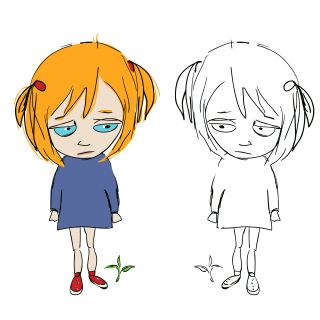These didn’t work, so he was prescribed more. Pushed out of one school after another, Andrew grew frustrated, unhappy and sometimes alarming. His parents hid the kitchen knives. Then his mother died at 54; the family believes that the stress of raising Andrew was a factor.
Friday, November 13, 2015
Drugs, Greed and a Dead Boy
These didn’t work, so he was prescribed more. Pushed out of one school after another, Andrew grew frustrated, unhappy and sometimes alarming. His parents hid the kitchen knives. Then his mother died at 54; the family believes that the stress of raising Andrew was a factor.Wednesday, September 9, 2015
These Illustrations Perfectly Sum Up What It's Like To Have ADHD It's so much more than being "not focused."
ADHD, also known as as ADD, affects 6.4 million children between the ages of 4 and 17, according to the CDC.
Monday, August 31, 2015
The Decline of Play and Rise in Children's Mental Disorders Children are more anxious and depressed than ever before. Why?

Friday, August 28, 2015
7 Qualities That Make a Great ADHD Doctor
Psychiatry’s Identity Crisis

With few exceptions, every major class of current psychotropic drugs — antidepressants, antipsychotics, anti-anxiety medications — basically targets the same receptors and neurotransmitters in the brain as did their precursors, which were developed in the 1950s and 1960s.
Sure, the newer drugs are generally safer and more tolerable than the older ones, but they are no more effective.
10 Things I’d Tell My Former (Medicated) Self
Saturday, August 8, 2015
How to Cut Children’s Screen Time? Say No to Yourself First.

Wednesday, July 29, 2015
Today’s Exhausted Superkids
There are several passages in the new book “Overloaded and Underprepared” that fill me with sadness for American high school students, the most driven of whom are forever in search of a competitive edge. Some use stimulants like Adderall. Some cheat.
But the part of the book that somehow got to me most was about sleep.
It’s a prerequisite for healthy growth. It’s a linchpin of sanity. Before adulthood, a baseline amount is fundamental and nonnegotiable, or should be.
But many teenagers today are so hyped up and stressed out that they’re getting only a fraction of the rest they need. The book mentions a high school in Silicon Valley that brought in outside sleep experts, created a kind of sleep curriculum and trained students as “sleep ambassadors,” all to promote shut-eye.
Wednesday, July 1, 2015
Parents’ Denial Fuels Childhood Obesity Epidemic
“I can’t believe you’re telling me I can’t buy Chips Ahoy! cookies,” said the mother, herself a nurse.Tuesday, June 16, 2015
The Medical Model Discovers Heroin Addiction
Heroin Epidemic
The United States is experiencing an epidemic of heroin addiction and a sharp rise in opiate over-dose death. Contrary to addicts being introduced to opiate addiction through street heroin, 75% of new addicts became addicted through prescription opiates. When the OxyContin becomes too expensive ($80/pill), people switch to the cheaper street heroin ($5-10/hit). Nora Volkow of NIDA, Tom Frieden of the CDC, and Michael Botticelli of the President’s Office of Drug Control Policy have advocated the expansion of methadone programs and buprenorphine treatment to respond to the epidemic. SAMSHA, the federal agency which regulates methadone maintenance programs, suggests that we call these interventions “Medication Assisted Treatment” (MAT) rather than opiate substitution programs so as not to stigmatize people.
Mind Your Body: Inward Bound
The mysterious connection between emotion and physical sensation is coming into ever-sharper focus.
The sight of a blazing sunset, the sound of a ringing phone, the aroma of fresh bread as you pass a bakery—we tend to think of sensory perception as the way we process external stimuli with our eyes, ears, mouth, nose, and skin. Yet there’s another form of sensory perception, known as interoception, that involves the feelings that originate within the body, such as hunger, thirst, breathlessness, pain, temperature, heartbeat, muscle tension, and bladder pressure.
None of the Above An emerging group of transgender people is looking beyond “man” and “woman."

When CN Lester shows up in the waiting room of, say, a doctor’s office and is asked to fill out a personal information form, the inevitable question arises: M or F? The tattooed 30-year-old has developed a habit of inking an extra box and checking it.
“The sheer act of doing so often makes someone take the form back silently,” says Lester, a classically trained musician who lives in London. “You can sometimes feel like a legal nonentity. It’s really frustrating.”
Lester, who as a child hated being called a girl but never felt quite like a “man trapped in a woman’s body,” came out as transgender 15 years ago. As an umbrella term, the word transgender refers to those whose sense of their gender differs from what is expected based on the sexcharacteristics with which they are born.
Monday, June 1, 2015
How to Find Your Place in the World After Graduation
Like practically everyone else, I gave a commencement speech last week. Mine was for the Paris College of Art, an American art and design school in France whose roughly 200 students hail from 48 countries.
In deciding what to say, I couldn’t rely on my own experience with commencement speeches. When I graduated from college, a United States senator delivered his stump speech on Poland, then wished us luck.
So I listened to lots of commencement speeches online. I quickly realized that the good ones are under 15 minutes; that it helps if you can do impressions; and that just because you starred in a hit sitcom doesn’t mean you possess great wisdom.
I also realized that commencement speeches are mostly an American phenomenon. In Britain there are graduation ceremonies, but no outside motivational speakers. “Every year, thousands of young British people collect their degrees and head into the world in a dangerously uninspired state — not knowing, for example, whether or not they should say ‘yes’ to life, or follow their hearts, or dare to be different,” wrote the journalist Oliver Burkeman.Wednesday, March 18, 2015
For Some in Transgender Community, It’s Never Too Late to Make a Change
Wednesday, March 4, 2015
If You Love Someone Who Has ADHD, Don’t Do These Things
Guide to Children Affected by Parental Drug Abuse
A conservative estimate is that one in six children in school today has a parent who is dependent on or addicted to alcohol or other drugs. This family situation places these students at high risk for social and emotional problems, as well as for school failure, drug use and delinquency. Most of these children are not identified as being “at-risk” and therefore do not receive assistance. Schools, however, are a logical place to reach them.
Wednesday, February 25, 2015
Loving a Person who has ADHD
People who have ADD/ADHD are suffering. Life is more difficult for them than the average person. Everything is intense and magnified. Their brilliant minds are constantly in gear creating, designing, thinking and never resting. Imagine what it would feel like to have a merry-go-round in your mind that never stops spinning.
Monday, February 23, 2015
A Lighter To-Do List: When In Doubt, Delegate!
Delegation is one of the best skills an ADHD adult can learn. Follow these tips to get your to-do list under control.
We ADDers spend a lot of time trying to do things that we don't do well or that we don't have to do ourselves. I'm talking about things that people around us can and will do for us, if we are willing to ask them.
What Everyone Gets Wrong About ADHD
Monday, February 16, 2015
Are You Emotionally Intelligent?
When emotional intelligence (EQ) first appeared to the masses, it served as the missing link in a peculiar finding: people with average IQs outperform those with the highest IQs 70% of the time. This anomaly threw a massive wrench into the broadly held assumption that IQ was the sole source of success.
Friday, January 30, 2015
Tuesday, January 20, 2015



